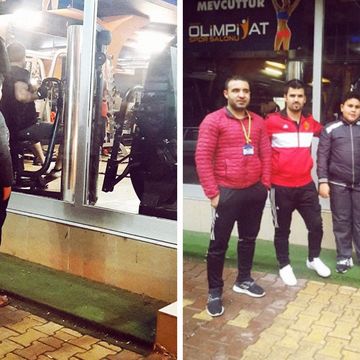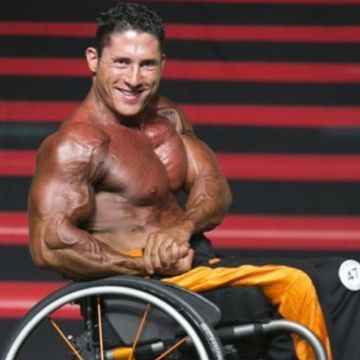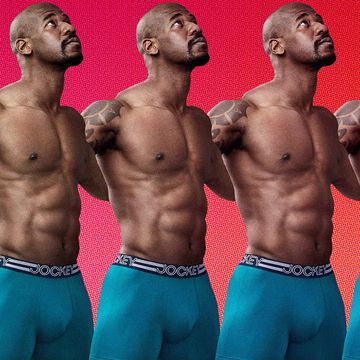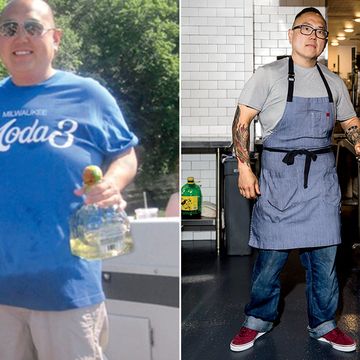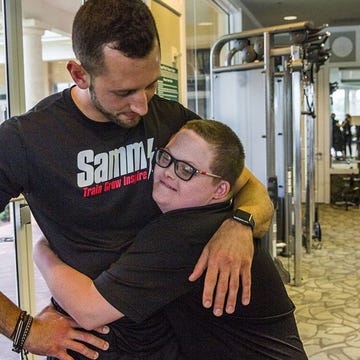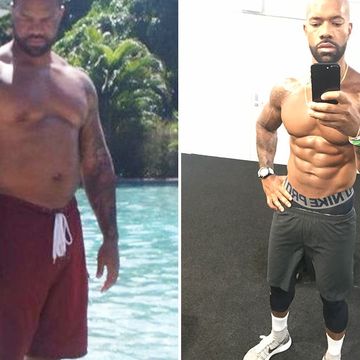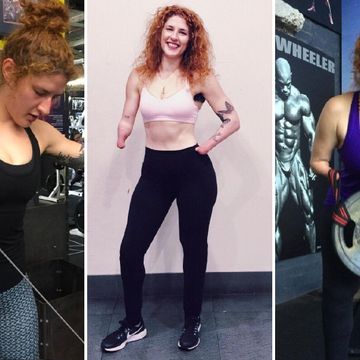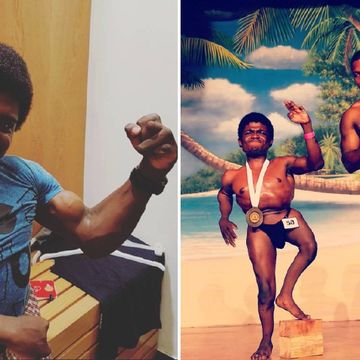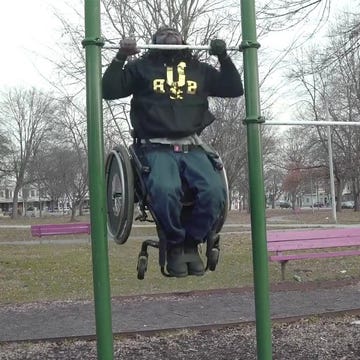We found six of the fittest men on the planet and asked them a simple question: What’s one thing you do each day that improves your fitness?
Take a cue from their routines—and reach the best shape of your life.
Make No Excuses
The Man
Rob MacDonald, training director of Gym Jones, one of the most hard-core gyms in the country.
Why He’s Insanely Fit
MacDonald once burned 87 calories in one minute on an AirDyne bike, and he holds the 500-meter SkiErg sprint world record in his age group.
His Secrets
If you had to describe MacDonald, you’d call him a machine. He never stops. He works and works and works to get bigger, stronger, and better. (Another man who is a mountain of muscle: the Rock. But click here to find out Why Dwayne Johnson is Technically Obese.)
“I never miss a workout, whether it’s an all-out day or a recovery day,” he says. “If I ever miss a goal, I don’t blame anything—I know that it’s on me, and that I did everything I could.”
The most frequent excuse that he hears from people who don’t meet their goals is that they don’t have enough time to train, he says. “That’s garbage. I sit those people down and we run a time credit and debit chart.”
Those charts factor in the time requirements of every single thing the person does in the week—from work and sleep, to eating and browsing social media.
“We find there are usually at least 10 hours in the week that aren’t accounted for, that just went missing,” says MacDonald. “So why weren’t they spent training?”
Run your own time credit and debit chart. For one week, write down everything you do and the time spent doing it. Then look for holes of wasted time.
The following week, use those extra hours toward your fitness goals. You won’t miss squandered time after you hit a new personal record at the gym.
Related: To get stories like this delivered to your inbox every day, sign up for The Men’s Health Daily Dose Newsletter—it’s free and it takes just seconds to register.
Become Bulletproof
The Man
Doug Kechijian, a Doctor of Physical Therapy at Peak Performance in New York City. Prior to his doctoral training, Kechijian completed six years as active duty Air Force Pararescueman, a job he continues to do part time in the National Guard.
Why He’s Insanely Fit
He’s done an iron cross, swam 100-meters on a single breath of air, and deadlifted 500 pounds at a bodyweight of 180.
His Secrets
“There’s nothing sexy about this,” says Kechijian. “But I do some sort of mobility or PRI work every day.”
(Note: PRI stands for Posturual Restoration Institute, where they teach a method that leverages breathing to create more efficient movement patterns.)
The reason: The drills allow Kechijian to get his body into correct form to make exercises and movements cleaner and more efficient. It helps with everything from runs to lifts.
Doing mobility work and PRI not only reduces his risk of injury in the field, but also allows him to tap his full performance potential.
And given Kechijian’s former full-time, now part-time job, staying injury free, fast, and strong literally keeps him out of a potentially life or death situation.
Kechijian acknowledges that you can get fit without optimizing your movement and mobility. “But not for the long haul,” he says. “Poor movement mechanics eventually cause your body to break down."
Make your own body more resilient with 3 Exercises That You Should Do Every Day.
Have Fun
The Man
Mat Fraser, a CrossFit competitor.
Why He’s Insanely Fit
He took 2nd place in the CrossFit Games in 2014—as a rookie.
His Secrets
Fraser, 25, started his fitness career at a very young age, winning various national youth Olympic lifting events. After graduating high school, he lived at the Olympic Training center in Colorado, and was poised to compete for Team USA in the 2016 Olympics.
But then he hurt his back. “After I rehabbed my injury and came back to the sport, I think I was training for the wrong reasons, and I just wasn’t having fun anymore,” says Fraser.
His training suffered, and he decided to leave the sport.
To keep in shape, he began going to a local CrossFit box just to do some Olympic lifting. But soon he joined the group workouts and got hooked—and fitness became fun again.
Now, he realizes that the success of his daily workout hinges on his mental state.
“No matter what, I make sure I go into the gym with a smile on my face,” says the Nike-sponsored athlete.
“The workouts are intense,” says Fraser. “But if I’m happy and having fun I’m willing to suffer a bit more, I’m more willing to dig deeper and go harder.” That, in turn, helps him reach greater heights in his fitness.
(Find out just how intense Fraser's workouts are in this story: How Many Calories Does CrossFit Really Burn?)
Fraser says that most days he wakes up happy. But if he’s in a bad mood, he’ll do something to cheer himself up—like go for a motorcycle ride or get a good lunch—before he tackles his training session at his CrossFit box.
Know Your Numbers
The Man
Chris Feather, a former professional rugby player and a Gym Jones fully certified instructor.
Why He’s Insanely Fit
He deadlifts 575 pounds, can row 2,000-meters in 6:09, and holds the 1,000-meter SkiErg world record in his weight class.
His Secrets
For a lot of people, going to the gym is just a means to tick off a box on the “to do” list. Not for Feather
“Mindset is key,” says Feather. “Whether I’m doing a recovery row or my hardest session of the week, I make sure I do the workout with a clear goal, and my full effort and attention.”
The way that Feather keeps himself honest: He measures his progress every single day.
“Numbers don’t lie,” says Feather. “Measuring my output and progress every workout allows me to mark my achievements and motivates me towards my next target.”
Feather says that if numbers are important, you should remember them. But if you have a short memory span, keep a training journal.
Whether it’s a tough workout or a mobility session, write down every rep and set, and keep track of your mental state during training. Then analyze that daily data to ensure you’re giving things your all.
See if there’s anything you would change during your next session, so you’re constantly improving.
(And for more tips that can help you transform your body, check out The Better Man Project. It’s a jam-packed user’s guide to every aspect of a man’s life, with more than 2,000 body hacks and fitness, nutrition, health, and sex secrets. All to make you a better man in every way that counts.
Baby Your Digits
The Man
Alex Viada, a hybrid strength and endurance athlete who owns Complete Human Performance.
Why He’s Insanely Fit
He’s deadlifted 700 pounds the same week that he’s run a 50-mile ultra marathon.
His Secrets
“I take 10 to 15 minutes and take care of my hands and feet each day,” says Viada.
Here’s why: Everything that fitness athletes do—whether they’re strength or endurance junkies—begins and ends with their hands and feet.
If your hands go because of a torn callous or blister, you can’t grab a bar, dumbbell, kettlebell, or ring, says Viada. And if you split a toenail or get a blister, your runs are surely going to suffer.
Each night Viada files down callouses, clips his nails, and moisturizes any hot spots. He even recommends that the ultra marathoners he trains get pedicures, even if it’s just to mend battered toenails and take care of old blisters.
“Having to not work out due to a preventable hand or foot problem is the stupidest way ever to ruin your progress,” says Viada. “Your hands and feet are literally where the rubber meets the road—take care of them.”
(For more life-changing health and fitness advice from the world’s top innovators, check out The Rodale 100.)
Just Do Something
The Man
Luke Nelson is a physician’s assistant and trail runner.
Why He’s Insanely Fit
He’s the seven-time winner of El Vacquero Loco, a 50K in Wyoming. He’s also the U.S. Ski Mountaineering Association National Champ of 2012 and holds the fastest time known time for climbing and descending all of Idaho’s 12,000-foot peaks.
His Secrets
You don’t have to run nearly every day like Nelson. And you don’t have to do air squats, pullups, and pushups between seeing patients like Nelson does either.
But there is a huge value in doing something—anything that helps your fitness—every single day. “I run six days a week—some days it’s just for 40 minutes, and my long run day can be four, five, six, or even eight hours,” says Nelson.
Related: 10 Exercises That Burn More Calories Than Running
On the seventh day, Nelson doesn’t rest. He does a 40-minute strength workout that bolsters his running.
“Consistency is what builds and maintains a high level of fitness,” says Nelson.
If your goal is to look and perform better, shoot for three intense strength training days per week. That’s the minimum you want to do to reach your strength and body composition goals. But don’t spend your “rest days” doing absolutely nothing.
Go for a long slow run. Take the dog for a long walk. Do sets of bodyweight exercises between meetings. Join your girlfriend in her yoga class. Do mobility exercises during commercials. Just do something.


